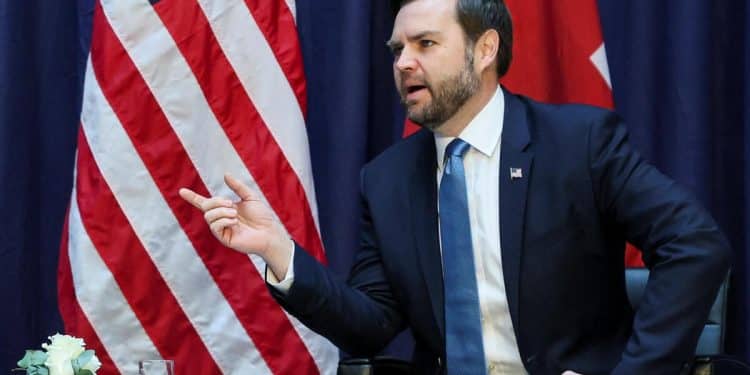JD Vance, Vice President of the United States, hammered the United States’ demand that NATO increase defense spending in Europe on Friday. This was ahead of a meeting of security officials in Europe.
The Future of Ukraine was the most important topic at the Munich Security Conference. This follows a phone conversation between U.S. president Donald Trump and Russian President Vladimir Putin, in which they committed to working together to resolve the three-year old conflict between Russia and Ukraine.
Vance will meet Ukrainian President Volodymyr Zelenskyy on Friday evening for a discussion that many observers in Europe hope can shed some light, at least, on Trump’s plans for a negotiated solution to the war.
Vance began his day in Munich by meeting with Mark Rutte of NATO, the German President Frank-Walter Steinmeier, and David Lammy of British Foreign Secretary. He used these engagements to reiterate Republican Trump’s call to NATO members to increase their defense spending. At the moment, 23 out of 32 NATO member countries are meeting the Western Military Alliance’s goal of spending 2% on defense.
Vance said to Rutte, “NATO is an important military alliance of which we are the most significant members.” “But we’re trying to ensure that NATO is built for the long-term, and we believe that a large part of this is making sure NATO shares more of the burden in Europe so that the United States can concentrate on our challenges in East Asia.”
Rutte agreed that Europe must step up. He said that “we have to spend more and grow up” in this sense.
The Ukrainian president stated that a Russian drone carrying a high explosive warhead had hit the Chernobyl nuclear power plant’s protective enclosure shell in the Kyiv area, hours before Vance was scheduled to meet Zelenskyy. Zelenskyy, as well as the U.N. nuclear agency, said that radiation levels had not increased.
Zelenskyy told reporters in Munich that the Chernobyl drone attack is “a very clear greeting from Putin, and Russian Federation, to the security conferences.”
Dmitry Peskov, Kremlin spokesperson, denied Ukraine’s allegations on Friday. Maria Zakharova, spokesperson for the Foreign Ministry, said that Munich’s organizers had not invited Russia in several years. She called this decision “strange” and “politized.”
The U.S. secretary of state Marco Rubio had been scheduled to meet with Vance and Zelenskyy, but his Air Force aircraft was forced to return to Washington due to a mechanical issue that developed en route from Washington to Munich. It was not clear if he would make it in time. He used a different plane.
Trump has not been specific about his intentions. He has only suggested that the deal would likely force Ukraine to cede territories that Russia has taken since annexed Crimea.
Trump told reporters on Thursday that the Ukraine war must end. “Young people have been killed in numbers that no one has seen since World War II. It’s a stupid war.
Trump’s musings left Europeans in an awkward position, wondering if they could maintain the post-WWII level of security NATO provided them with or if there was a way to fill in the millions of dollars in security assistance the Democratic Biden Administration had provided Ukraine since the Russian invasion in February 2022.
Trump is likely to reduce or limit this aid as soon as the negotiations begin in the next few days.
Trump and U.S. Secretary of Defense Pete Hegseth have undermined Ukraine’s hopes to join NATO – which the alliance had said was irreversible less than a month ago – or to regain its territory that Russia has taken over, including Crimea, which is currently occupying close 20%.
Trump said on Thursday that “I do not see a way in which a country like Russia could allow… them to become allied with NATO.” “I don’t see that happening.”
Keir starmer, the British prime minister, told Zelenskyy that Ukraine should be allowed to join NATO.
In recent days, Trump said that he wanted to reach an accord with Ukraine in order to gain access the rare earth materials of the country as a condition to continue U.S. assistance for Ukraine’s defence against Russia. He confirmed this week that his aides are working on a deal.
Vance replied, “We’ll have to see” when asked Friday whether a deal could be reached in Munich.
Vance said in an interview to the Wall Street Journal that if Putin refused to agree to a long-term peace agreement with Ukraine, which guaranteed Kyiv’s independence, the U.S. could take sanctions against Moscow and possibly military action.
The Trump administration has repeatedly expressed a desire for a quick end to the war. This warning that “military options remain on the table” is striking.
Zelenskyy may have felt some relief after the U.S. assurances, but they won’t replace the lost economic or military support provided by President Joe Biden.
The Ukrainian leader admitted Thursday that Trump’s first conversation with Putin was “not pleasant”. He said that the most important thing was “not to allow everything to go as per Putin’s plan.”
Zelenskyy, who visited a nuclear plant in western Ukraine, said: “We can’t accept any agreements made without us as an independent nation.”
Trump’s actions have also roiled Europe in the same way that his remarks about France and Germany during his first term shook Europe.
Benjamin Haddad, the French Deputy Minister of Foreign Affairs, described Europe as being in a pivotal moment, where the ground is shifting under its feet. He said that Europe must stop relying on the United States to ensure its security. He warned that a Russian victory in Ukraine would have consequences for Asia as well.
“I don’t think we understand the magnitude of our world changing,” Haddad told France Info on Thursday. Haddad said to France Info that both our competitors and allies were busy accelerating.










